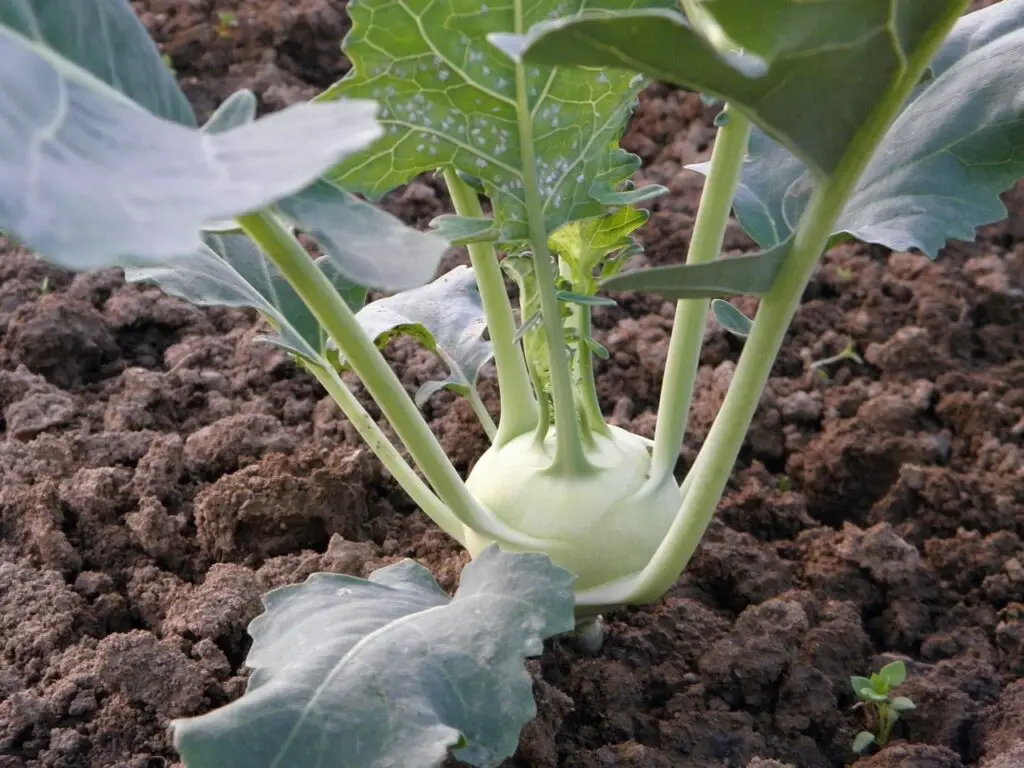If you’re a dog owner, you may have found yourself asking the question: can dogs eat kohlrabi?
As human beings, we know that kohlrabi is a nutritious and tasty vegetable that can be cooked in a variety of ways.
However, when it comes to feeding our furry friends, it’s important to be mindful of what they can and cannot eat.
In this article, we’ll explore whether or not kohlrabi is a safe and healthy food for dogs, and what precautions should be taken if you choose to give it to them.
- Can Dogs Eat Kohlrabi?
- How Many Kohlrabi Can Dogs Eat?
- How Often Can Dogs Eat Kohlrabi
- Health Benefits of Kohlrabi To Dogs
- Potential Risks of Feeding Kohlrabi To Dogs
- Nutritional Benefits of Kohlrabi For Dogs
- Are Dogs Sensitive To Kohlrabi?
- How To Prepare Kohlrabi For Dogs
- How Fast Will Dogs Digest Kohlrabi?
- FAQs
- In Conclusion
Can Dogs Eat Kohlrabi?

Yes, dogs can eat raw and cooked kohlrabi in moderation. It’s a low-calorie vegetable that is high in fiber, potassium, and vitamin C, making it a great addition to a balanced diet for dogs.
However, it’s important to note that dogs have different nutritional needs than humans, so it’s best to consult with a veterinarian before introducing kohlrabi or any new food into your dog’s diet.
Additionally, you should always wash and prepare kohlrabi properly, and avoid feeding your dog any kohlrabi that has been seasoned or cooked with onions or garlic, as these can be toxic to dogs.
See also: 47 Safe Vegetables To Feed Your Dog. Puppy Power!
How Many Kohlrabi Can Dogs Eat?

The quantity of kohlrabi that a dog can consume depends on the size, breed, and age of the dog.
Generally, it’s recommended to give kohlrabi to dogs in moderation to avoid digestive issues.
A good rule of thumb is to give small dogs up to 1-2 slices of kohlrabi per day, while larger dogs can have up to half a cup of kohlrabi.
It’s always important to monitor your pet’s reactions when introducing any new food and to consult with a veterinarian if you have any concerns.
Kohlrabi Feeding Chart According To Size
| Food | Size | Portion |
|---|---|---|
| Kohlrabi | Toy dogs | 1-2 slices |
| Kohlrabi | Small dogs | 1-2 slices |
| Kohlrabi | Medium dogs | half a cup |
| Kohlrabi | Large Dogs | half a cup |
Kohlrabi Feeding Chart According To Age
| Food | Age | Portion |
|---|---|---|
| Kohlrabi | 0 – 6 months | Don’t feed |
| Kohlrabi | 6 – 12 months | 1-2 slices |
| Kohlrabi | 12 – 24 months | half a cup |
| Kohlrabi | 24+ months | half a cup |
How Often Can Dogs Eat Kohlrabi
Dogs can eat kohlrabi a few times a week, but it should not be a significant portion of their regular diet, as it is not a complete source of nutrition for dogs.
Kohlrabi can be a healthy and tasty addition to your dog’s meals, but it should be given in moderation to avoid any digestive issues.
It’s always a good idea to consult with a veterinarian about the best diet plan for your individual dog’s needs.
Health Benefits of Kohlrabi To Dogs
- Good for digestion. Kohlrabi is an excellent source of fiber, which can aid in digestion and promote healthy bowel movements in dogs. Fiber helps to bulk up stool and regulate the digestive process, which can be helpful for dogs who suffer from stomach issues or constipation.
- Rich in potassium. Kohlrabi contains high levels of potassium, an essential mineral that helps to regulate blood pressure and heart function in dogs. A diet that’s rich in potassium can also help to maintain bone density and muscle function in dogs.
- High in vitamin C. Kohlrabi is a good source of vitamin C, which is an antioxidant that can help to boost the immune system and prevent cell damage in dogs. Vitamin C is also important for the production of collagen, a protein that helps to maintain the health of skin, ligaments, and tendons.
- Low in calories. Kohlrabi is a low-calorie vegetable, which makes it a great addition to a weight-loss diet for dogs. It’s also high in water content, which can help to keep dogs feeling full and hydrated.
- Supports good vision. Kohlrabi contains high levels of vitamin A, which is essential for good vision in dogs. Vitamin A helps to maintain the health of the eyes and can prevent vision loss or other eye-related health issues. It’s important to note that kohlrabi should be given to dogs in moderation, as it should not be a significant portion of their regular diet. Additionally, it’s always a good idea to consult with a veterinarian before adding new foods to your dog’s diet to ensure that it’s safe and appropriate for their individual needs.
Potential Risks of Feeding Kohlrabi To Dogs
- Digestive issues. While kohlrabi is a great source of fiber, consuming too much of it can cause digestive issues in dogs such as bloating, gas, or diarrhea. To avoid this, it’s important to introduce kohlrabi to your dog’s diet gradually and only in small quantities.
- Presence of oxalates. Kohlrabi contains oxalates, a naturally occurring substance that can interfere with the absorption of calcium in dogs. High levels of oxalates can cause kidney stones or other health issues in dogs. Therefore, it’s essential to avoid overfeeding kohlrabi to your dog and ensure that it’s properly prepared so that the oxalate content is minimized.
- Preparation. Kohlrabi should be prepared and served to dogs in a manner that’s free of salt, butter, or any other additives such as garlic, onions, or other ingredients that can cause severe health issues in dogs. Raw kohlrabi can contain harmful microbes that can cause illnesses, so it’s recommended to wash and cook kohlrabi thoroughly before feeding it to your dog.
Nutritional Benefits of Kohlrabi For Dogs
| Kohlrabi Nutrition Facts per 100 grams | % DV * |
|---|---|
| Calories | 27 |
| Total Fat | 0.1 g |
| Cholesterol | 0 mg |
| Sugar | 2.6 g |
| Glycemic Index | 20 |
| Sodium | 20 mg |
| Carbs | 6 g |
| Protein | 1.7 g |
| Vitamin C | 10% |
| Calcium | 12% |
| Iron | 2% |
| Potassium | 350 mg |
Are Dogs Sensitive To Kohlrabi?
Dogs can develop a sensitivity or intolerance to kohlrabi, just like any other food.
Common symptoms of food sensitivity in dogs include skin irritation or rashes, itching, vomiting, diarrhea, and difficulty breathing.
If your dog is experiencing any of these symptoms, it’s essential to stop feeding them kohlrabi and seek immediate veterinary attention if necessary.
Allergic reactions to kohlrabi are rare, but they can still happen, and it’s important to be aware of potential signs of sensitivity or intolerance.
It’s always best to introduce new foods to your dog’s diet gradually and monitor for any adverse reactions. If you notice any symptoms of sensitivity, contact your veterinarian for guidance.
How To Prepare Kohlrabi For Dogs
Raw kohlrabi
Kohlrabi can be sliced or shredded into bite-sized pieces and given to your dog as a crunchy and nutritious snack. Be sure to wash the kohlrabi thoroughly and remove the tough outer layer before serving it to your furry friend.
Steamed or boiled kohlrabi
You can also cook kohlrabi by steaming or boiling it until it’s soft, which makes it easier for your dog to digest. You can serve it as a side dish or mix it in with your dog’s regular food.
Pureed kohlrabi
For dogs who have difficulty chewing or with dental issues, pureed kohlrabi can be a great option. Simply cook the kohlrabi until soft and blend it in a food processor or blender until it has reached a smooth consistency. You can then mix it in with your dog’s food or serve it as a stand-alone meal.
How Fast Will Dogs Digest Kohlrabi?
The speed at which dogs digest kohlrabi depends on various factors, such as the size, age, and health of the dog, and also how the kohlrabi is prepared.
Generally, raw or lightly cooked kohlrabi is easier to digest, and most dogs are able to fully digest it within a few hours after eating.
However, it’s important to keep in mind that overfeeding kohlrabi, or feeding it too often, can lead to digestive issues like diarrhea, bloating, and gas, which can slow down the digestive process.
If you notice any digestive issues or changes in your dog’s bowel movements after feeding them kohlrabi, it’s important to adjust the amount and speak to a veterinarian if the symptoms persist.
FAQs
Can dogs eat kohlrabi leaves?
Yes, dogs can eat kohlrabi leaves. In fact, many dogs find the taste and texture of kohlrabi leaves to be quite delicious. When feeding your dog kohlrabi leaves, it is important to make sure that they are cooked thoroughly since raw kohlrabi may contain compounds that could upset your pet’s stomach.
In Conclusion
In conclusion, kohlrabi can be a healthy and beneficial addition to your dog’s diet when given in moderation and properly prepared.
It’s a great source of fiber, potassium, vitamin C, and other nutrients that can support your dog’s overall health and well-being.
However, it’s important to be mindful of the risks associated with feeding dogs kohlrabi, such as digestive issues and the presence of oxalates.
Additionally, it’s crucial to consult with a veterinarian before introducing any new food into your dog’s diet to ensure it’s safe and appropriate for their individual needs.
With proper preparation and feeding in moderation, kohlrabi can be a delicious and nutritious treat for your furry friend.





Leave a Reply